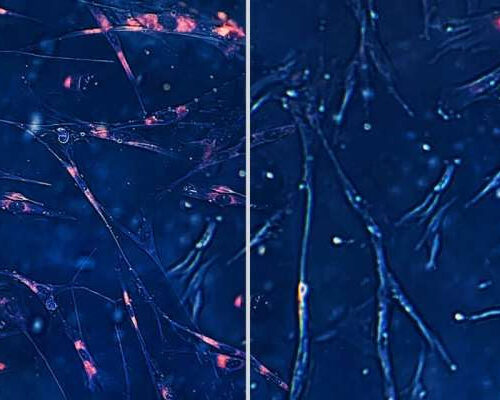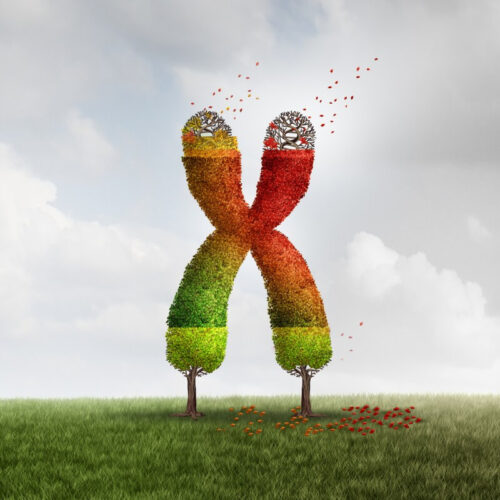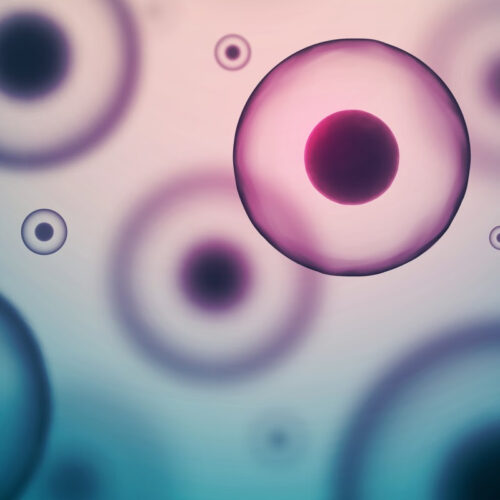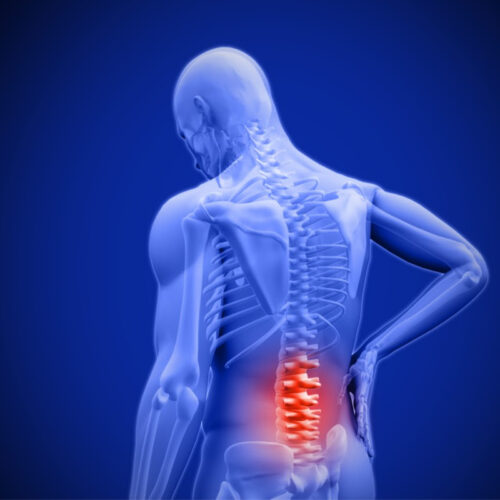Researchers are using nanotechnology to recharge the “powerhouse of the cell” to fight against disease and aging. The ability to recharge cells diminishes as humans age or face diseases. Mitochondria, often called the powerhouse of the cell, are central to energy production. When mitochondrial function declines, it leads to fatigue, tissue degeneration, and accelerated aging. Activities...
Tag: <span>Anti-Aging</span>
Artificial intelligence identifies anti-aging drug candidates targeting ‘zombie’ cells
by Ten Bridge Communications Senolytics are an emerging class of investigational drug compounds that selectively kill aging-associated senescent cells (left, with red stain) without affecting other cells (right). Using artificial intelligence, researchers from Integrated Biosciences have, for the first time, identified three senolytics with comparable efficacy and superior drug-like properties relative to leading investigational compounds....
Scientists Discover That a Certain Nutrient Promotes Anti-Aging
By FUNDAÇÃO DE AMPARO À PESQUISA DO ESTADO DE SÃO PAULO SEPTEMBER 3, 2022 According to a clinical trial involving 55 to 70-year-old women, adding this nutrient to the diet can strengthen the body’s antioxidant defenses and possibly lower the chance of developing diabetes, high blood pressure, and cardiovascular disease. However, more research is needed to confirm...
Anti-aging research uncovers new role for telomeres
By Michael Irving November 09, 2021 A new study suggests that telomeres, protective caps on the tips of chromosomes, might play a different role in aging than previously thoughtlightsource/Depositphotos Aging affects everybody, so it’s easy to understand why so much scientific attention is focused on studying it. Scientists in Canada now claim to have found...
Anti-aging drug acts as a “smart bomb” to take out dysfunctional cells
By Nick Lavars A new anti-aging breakthrough could clear out senescent cells with great precisionElymas/Depositphotos Back in 2015 we saw a new class of drugs emerge with huge potential when it comes to the aging process and how it might be slowed. Scientists working to improve the potency and safety of these so-called senolytic drugs have made...
Anti-aging drugs preserve spinal discs to target age-related back pain
Scientists have found that a relatively new class of drugs known as senolytics can prevent spinal disc degeneration in miceWavebreakmedia/Depositphotos As the human body grows older, its tissues accumulate higher concentrations of what are known as senescent cells, which no longer possess the ability to divide and instead accelerate the aging process. By investigating this...
Novel study documents marked slowdown of cell division rates in old age
Clearer understanding of lower cell replication rates in old age may have implications for preventing cancer and slowing aging JOHNS HOPKINS MEDICINE In a novel study comparing healthy cells from people in their 20s with cells from people in their 80s, researchers at the Johns Hopkins Kimmel Cancer Center say they have documented that cell...
How to Reverse Aging and Become Whoever You Want to Be
You may think your body ages at its own pace regardless of your state of mind, but research says otherwise. Inc.|Benjamin Hardy, Ph.D In 1978, Ellen Langer, a Harvard psychologist, conducted an important study. She gave houseplants to two groups of nursing-home residents. One group was told they were responsible for keeping their plant alive, and that they had autonomy in...
Going nuts for anti-aging
The pecan is a North American deciduous walnut tree. Its seeds, pecan nuts, are sweeter in flavor than walnuts and are said to be more popular than almonds in the U.S. What deserves attention is the pecan nut’s antioxidant power. It’s said to have more anti-aging effect than the walnut, rapidly gaining it popularity in...
Inflammation-driven deterioration of structural proteins contributes to aging
Posted YesterdayThis news or article is intended for readers with certain scientific or professional knowledge in the field. Aging-related inflammation can drive the decline of a critical structural protein called lamin-B1, which contributes to diminished immune function in the thymus, according to research from Carnegie’s Sibiao Yue, Xiaobin Zheng, and Yixian Zheng published in Aging Cell. Each of our cells is undergirded by...





